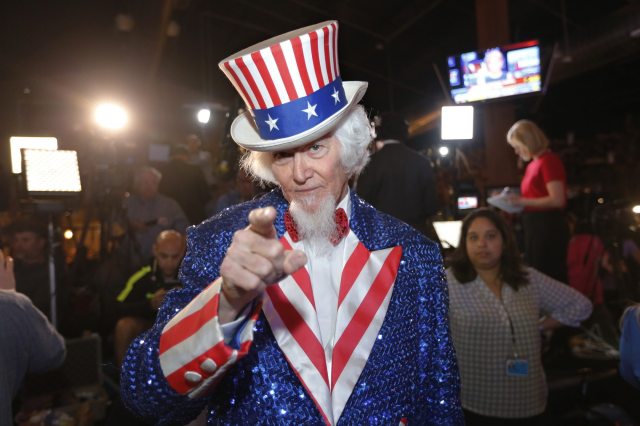Credit: Erich Schlegel / Getty

America’s midterm elections have come, but the turmoil that roils American politics has not gone. The result – Democrats win the House, Republicans expand their majority in the Senate – reflected the stark divide in values that is reshaping American politics. The cities support liberal globalism while the small towns and countryside back conservative nationalism.
Democrats won seats in most of the suburbs of America’s major cities. They have gained 32 seats, at the time of writing (counting will continue for up to three weeks in some states), and are leading in four more. Many of the cities where they gained seats had been carried by Republicans for decades, but Trump’s embrace of conservative nationalism drove voters into the arms of Democrats.
These voters are global liberals. They think environmental regulation is more important than protecting jobs in mining, logging and manufacturing. They take the secular side in America’s rancorous debates over abortion, same-sex marriage and transgender rights. They think immigration should be largely unrestricted and that trade should be entirely unrestricted. In their view, they are “open” while their adversaries are “closed”: closed to human rights, closed to economic growth, closed to the future.
These new Democrats are the American version of the anti-Brexit Tories who voted Labour in 2017 or the city-dwelling CDU/CSU voters who backed Greens in the recent Bavarian and Hessian German state elections. Well-educated and separated from cultural turmoil by their ability to buy into exclusive neighbourhoods, these voters like the way things are and do not want to change.
The fact that they are in a tacit alliance with the far Left in these countries does not bother them. For them, for now, the enemy is anyone who wants to slow economic change in the name of national solidarity and slow cultural change in the name of the traditional family. They are as yet unworried about the possibility some of their new friends might be future enemies.
As for the Republicans, they gained seats in the Senate because the states that were voting had large small-town and rural populations whose voters liked Trump’s message. Democratic incumbent senators lost in places where the majority of the population is not urban or suburban, where voters echoed their 2016 pro-Trump voting patterns by backing his friends.
These voters draw different lessons from current events than their upscale brethren. Suburbanites watched the Brett Kavanaugh hearings and saw a credible accuser in Christine Blasey Ford and an entitled white male abusing his privilege. Rural voters saw a man whose reputation was wrecked by unsubstantiated, last-minute charges levied by desperate political opponents.
Suburbanites think Trump’s warnings about the dangers posed by the “caravan” of Guatemalan refugees moving through Mexico to the American border are overblown at best and racist at worst. Rural voters see people who at best would compete for their jobs and at worst live on the dole – and who might harbour a couple of terrorists in their midst. The worlds these voters live in are as different as the neighbourhoods in which they reside.
Americans can see the sharpening and deepening divisions engulfing them; on election night more than a few victors said they hoped to bring the country together. But attempts at harmony didn’t last long.
The temporary ceasefire ended when one conservative journalist overheard incoming House Judiciary Committee Chair Jerry Nadler (Democrat) tell friends that Democrats would investigate Kavanaugh for potentially perjuring himself during his testimony and would look into Trump’s dealings with Russia.
Independent of this revelation, Trump tweeted that if House Democrats investigate him then Senate Republicans would investigate them for allegedly leaking classified information. He also forced Attorney General Jeff Sessions to resign and revoked a CNN reporter’s White House press pass after he was rude at a press conference.
Just another day in America’s corrosive politics.
Focus will now shift to the Democratic contest to select who will face Trump in the 2020 elections. In most countries this battle would take place behind closed doors and take a few days. But American parties select their presidential nominees via a series of 56 independent elections in each state and territory, a process that will take place over seven months in early 2020.
Contenders will spend much of 2019 raising the hundreds of millions of dollars they will each need to be viable and will have to travel across this massive country in search of votes and media attention. Exit polls from Tuesday’s race show that 77% of Democrats favour impeaching the president; any Democrat who wants to succeed him will need to appeal to this vast majority by emphasising their hatred of him and everything he stands for.
The Supreme Court will also play an important role in politics over the next two years. As Alexis de Tocqueville wrote nearly 200 years ago: “Scarcely any political question arises in the United States that is not resolved, sooner or later, into a judicial question.” That’s even more true today since the court has effectively removed any issue of social legislation from the political sphere and made it a matter of constitutional jurisprudence. It is quite likely that some case involving a politically sensitive matter will be decided by the court in the near future, further inflaming one side or another in America’s eternal culture war.
We can not foresee how this battle will conclude, or whether it will conclude at all after the next vote. All we can foresee is that American will increasingly be set against American – religious versus secular, city versus country, centre versus the coasts – in an increasingly bitter conflict. Put in that context, the midterms are just another skirmish on the road to an even bloodier battle.










Join the discussion
Join like minded readers that support our journalism by becoming a paid subscriber
To join the discussion in the comments, become a paid subscriber.
Join like minded readers that support our journalism, read unlimited articles and enjoy other subscriber-only benefits.
Subscribe